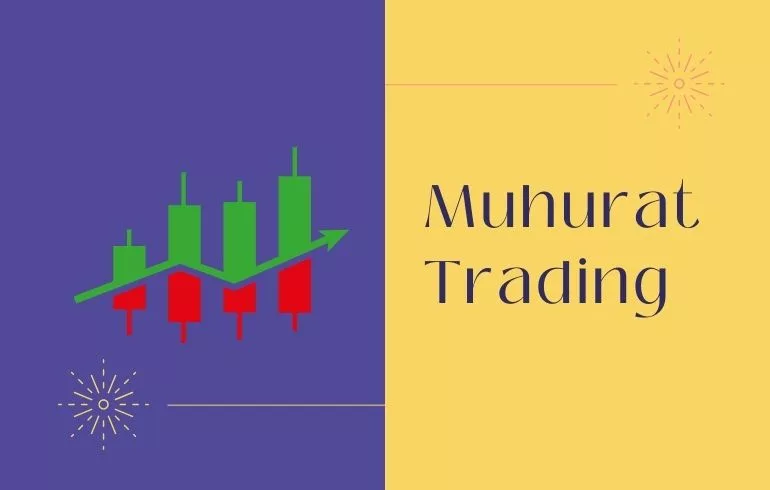
Muhurat Trading 2023: Everything You Should Know
The Festival of Lights – Diwali is an auspicious time according to the Hindu calendar. It symbolizes the victory of light over darkness, knowledge over ignorance, and good over evil.
Like any religious festival, there is a plethora of beliefs, customs, and traditions that surround Diwali. One such tradition is Muhurat trading.
Muhurat Trading, also known as Mahurat Trading, is a special trading session in the Indian stock markets that takes place on the occasion of Diwali, which is one of the most important and widely celebrated festivals in India. This tradition has a long and rich history, dating back to the early 1950s.
Muhurat Trading Timings 2023
Here is a quick look at the Muhurat Trading time, 2023 for both BSE and NSE:
Muhurat Trading will be conducted on November 12, 2023 (Sunday).
| Event | Time |
|---|---|
| Pre-Open Session | 6:00 PM – 6:08 PM IST |
| Muhurat Trading | 6:15 PM – 7:15 PM IST |
| Post-Close Session | 7:30 PM – 7:38 PM IST |
| Market Close | 7:40 PM IST |
Muhurat trading: History and origin
Here's a brief overview of the history and origin of Muhurat Trading:
Early Origins: The tradition of Muhurat Trading began in the 1950s when stockbrokers and traders decided to open the stock markets for a short period on Diwali, the festival of lights. Diwali is considered an auspicious day in Hindu culture, and it marks the beginning of the new financial year in India.
Auspicious Timing: The term "Muhurat" refers to an auspicious or propitious time. Traders and investors believe that conducting trades during this special session on Diwali can bring good fortune and prosperity to their investments in the coming year. The timing of the session is carefully chosen based on astrological and traditional beliefs to ensure a positive start to the trading year.
Short Trading Window: Muhurat Trading typically lasts for a brief period, often about one hour in the evening, just before the regular market closing. During this time, traders and investors can buy and sell stocks and other financial instruments.
Rituals and Traditions: On this day, traders and investors perform various rituals, including worshiping their account books and making offerings to Lord Ganesha and Goddess Lakshmi, the deities of wealth and prosperity. These rituals are meant to invoke blessings for a profitable and successful year ahead.
Continued Tradition: Over the years, Muhurat Trading has become a cherished tradition in the Indian stock markets. Even as the stock market has evolved and expanded, the practice of conducting a special trading session on Diwali remains a popular and widely observed custom.
Timing: Muhurat Trading is held for a brief period in the evening on Diwali day. The specific timing for the session is announced by the stock exchanges like the BSE (Bombay Stock Exchange) and NSE (National Stock Exchange) a few days before Diwali. The session typically lasts for about one hour, and the exact start and end times can vary from year to year.
Traditional Rituals: Before the Muhurat Trading session begins, traders and investors often participate in traditional rituals. This may include performing prayers, offering prayers to deities like Lord Ganesha and Goddess Lakshmi, and seeking blessings for a prosperous and successful trading year ahead. Many traders also perform a ceremonial lamp-lighting to mark the start of the session.
Symbolic Trading: Muhurat Trading is largely symbolic, and its main purpose is to mark the beginning of the new financial year. During this session, traders and investors may engage in buying and selling stocks, just like they would in regular trading sessions. However, the actual trading activity is often limited, and the market tends to be less volatile compared to regular trading sessions.
Trading Rules: The same trading rules and regulations that apply to regular trading sessions are also applicable during Muhurat Trading. The session follows the same trading systems and processes used by the stock exchanges.
Market Performance: Muhurat Trading's impact on market performance is generally limited, and it is more about tradition and symbolism than substantial market movements. However, the market's performance during this session is closely watched and analyzed by some traders and analysts for any potential signals or trends for the upcoming year.
Market Sentiment: Muhurat Trading often reflects the overall sentiment and mood of the market participants, and it can set the tone for the trading year ahead. A positive and buoyant Muhurat Trading session is considered a good omen for the markets.
Limited Liquidity: Due to the shorter trading duration and lower trading volumes compared to regular trading sessions, liquidity may be lower during Muhurat Trading. This can lead to wider spreads between buy and sell prices for stocks.
Closing Traditionally: The Muhurat Trading session is ceremoniously closed by traders and investors with the ringing of the closing bell, followed by more prayers and offerings.
Muhurat Trading: Historical Sensex performance
Muhurat Trading is a special, symbolic trading session in the Indian stock markets, held on the occasion of Diwali, and its historical performance in terms of the S&P BSE Sensex (Sensex) can vary from year to year. The Sensex is a benchmark index that represents the performance of the top 30 stocks listed on the Bombay Stock Exchange (BSE). While Muhurat Trading is primarily a symbolic event and its impact on market performance is limited, it's interesting to look at historical data for the Sensex during these sessions.
The performance of the Sensex during Muhurat Trading sessions can depend on various factors, including the overall market sentiment, economic conditions, and global events. The historical Sensex data during Muhurat Trading sessions may show mixed results, and it is important to remember that these sessions are relatively short and have lower trading volumes compared to regular trading days.
Historical Sensex performance during Muhurat Trading sessions may include instances where the index saw gains, losses, or relatively flat movements. While there may be some patterns or historical trends, they should not be used as a sole basis for making investment decisions. The Indian stock market's overall performance and trends are influenced by various economic, political, and global factors, which go beyond the significance of this symbolic session.
What happens in Muhurat Trading?
On Diwali, both NSE (National Stock Exchange) and BSE (Bombay Stock Exchange) permit trading for a limited time. Typically, the session is divided into the following parts:
- Block Deal Session – where two parties agree to buy/sell a security at a fixed price and inform the stock exchange about it
- Pre-Open Session – where the stock exchange determines the equilibrium price (usually around eight minutes)
- Normal Market Session – the one-hour session where most trading takes place
- Call Auction Session – where illiquid securities are traded. Security is termed illiquid if it satisfies the criteria set by the exchange.
- Closing Session – where traders/investors can place a market order at the closing price.



















